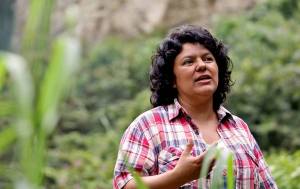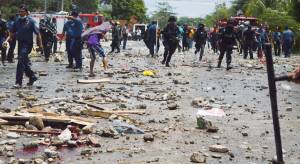We are deeply discouraged and saddened to see so many stories in just the past few weeks of violent attacks against peaceful activists calling for justice and saying no to extractive industries. Many of these have resulted in death, injury, and intimidation.
Today, we learned that activists protesting a coal plant in Bangladesh were killed. Friday, it was farmers in the Philippines seeking assistance from a climate change-exacerbated drought. Two weeks ago, it was Sikhosiphi ‘Bazooka’ Rhadebe, an anti-mining activist in South Africa. And a month ago, Berta Cáceres was assassinated in Honduras, followed closely by the assassination of Nelson Garcia, another member of the environmental and Indigenous rights group COPINH.

Berta Cáceres
We learned of the death of Berta Cáceres during a phone call with some of our allies, talking about how we might better work together and respond to recent crackdowns on activists defending the environment, democratic space, and human rights. It was a painful irony.
The appetite to fight back and to work together is strong, but many more people and voices are needed. We need to defend the defenders, and send a message that violent crackdowns will not go unnoticed. People fighting extractive industries everywhere are increasingly united, and intimidation will not make these movements go away.
When violence is used to silence protest, democracy is placed under threat, in addition to personal freedoms and lives. Violence can have a chilling effect: people tend to stay home more and speak out less. But the people-powered tools we most often use at 350.org — mass mobilization and distributed actions– work when an ever-increasing chorus of people join in to shift the balance of power. When protest becomes harder, we need to collectively speak out more, not less — wherever and however we can. When protest becomes risky for our friends and allies in other parts of the world, it becomes the job of those who can to get even louder.
We have been inspired by so many movements and organizations that have mobilized to defend the defenders, and we see enormous potential in linking the climate movement to the movement to protect human rights and freedoms. The threats we face on both fronts are linked at their roots, and we cannot fight for climate justice without fundamental human rights protections for those most impacted.

AP Photo/Williamor Magbanua
If we are to succeed in stopping the worst effects of catastrophic climate change, it will be because we have been able to keep fossil fuels in the ground. With thousands of projects proposed all over the world (even with the recent decline of coal, there are 2,400 coal-fired power plants currently under construction or being planned), the work is just getting going. Many of these projects are proposed in places with the severest restrictions on protest; meanwhile, the people targeted in violent crackdowns — in both the Global South and the Global North — are very often the most marginalized people in a given community.
Last year saw a turning of the tide in the climate movement, with numerous victories against fossil fuel expansion. Many of us took heart from the fact that, truly, the end of the age of fossil fuels is upon us. Shell withdrew its permit to drill in the Arctic after “kayaktivists” creatively blocked their drilling rigs on the water. President Obama denied the permit for the Keystone XL pipeline. Five states in Brazil have placed a moratorium on fracking. Ninety percent of new energy capacity installed last year was renewable.
However, an economic transformation at this scale — from fossil fuels to 100% renewable energy — will not happen without resistance from the powers that be. The fossil fuel industry is, after all, one of the most profitable in the history of profit, and no stranger to fights with movements. The greed fueling fossil fuel expansion is also fueling inequality on an unprecedented scale. This was apparent even before the largest leak in history revealed how the oil and gas industries take advantage of the particular scourge of offshore tax havens.
So, we know our foe is formidable. But we know our movement is too. In India, the movement for 100% renewable energy remains strong, even with much potential for coal expansion and a government that’s increasingly restricting activists’ activities. In the Philippines, our colleague Zeph Repollo has inspired us for years in her quest for climate justice, as her country faces typhoons and droughts, all while contributing almost nothing to the problem of climate change. In South Africa, community members in Johannesburg are demanding that renewable energy, not coal, be the means for them to have reliable electricity for the first time.
In May, we will be mobilizing around the world with many of our partners to “break free” from fossil fuels. Breaking free from the violence and destruction of extractive industries is more urgently needed than ever, but in many places we’ll be mobilizing where we know it is hard to mobilize. For those of you who can join us, we hope you will. And for those who can’t, we hope you’ll join with us from afar — because solidarity that is global, visible, and loud is our best defense against those who would silence dissent with violence.